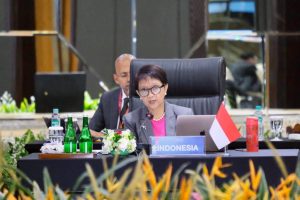This week, Indonesian Foreign Minister Retno Marsudi gave an interview with the Reuters news agency in which she said that Myanmar’s military was responsible for the failure of the Association of Southeast Asian Nations (ASEAN)’s five-point consensus peace plan.
In the interview, she defended the Southeast Asian bloc against claims that it had failed to resolve the country’s conflict or prevent its spread. “The criticisms shouldn’t be aimed at ASEAN. They should be aimed at the junta,” she told Reuters. “If we’re talking about who’s to blame, who’s failed, it’s not us, it’s not ASEAN. We did our part.”
The five-point consensus, which was agreed at a special ASEAN meeting in April 2021, calls for an immediate cessation to violence and inclusive talks between the various parties to the conflict touched off by the military’s coup that February.
Almost from the moment it was agreed, the agreement has been criticized for assuming the military junta’s good faith. This has only become more apparent as time has gone by, and the military has used lethal force to quash those resisting its rule, with whom it has refused to engage in negotiations. For its own part, the military says that it is prioritizing the restoration of “stability” within the country, and has refused to engage in talks with the opposition National Unity Government (NUG), which it has designated a “terrorist” organization.
Retno’s comments are therefore no surprise for anyone paying attention to what is happening in Myanmar, even if for ASEAN officials publicly stating the obvious can be difficult in light of the bloc’s policy of “non-interference” in member states’ affairs.
Indeed, it is very likely that the discussions behind closed doors have been a good deal more candid and critical. Frustration within the bloc has been building for much of the past year, as the junta’s lack of commitment to the consensus has become more and more apparent. In particular, its execution of four pro-democracy activists in July, just prior to an ASEAN Foreign Ministers’ Meeting, seems to have shifted opinion within the bloc.
The push for a more robust approach to Myanmar’s conflagrations has been led by Malaysia’s Foreign Minister Saifuddin Abdullah. Saifuddin has called for ASEAN to open talks with the NUG – something that is entirely consistent with the five-point consensus – and even to ask whether the consensus should be scrapped in favor of a different approach.
Retno’s comments, which indicate that Indonesia could take a harder line on Myanmar when it assumes the bloc’s rotating chairmanship next year, come after a week after ASEAN foreign ministers held a special meeting on Myanmar. At the close of the meeting, they acknowledged that their efforts to bring peace to Myanmar haven’t succeeded, but clarified that they remained committed to the five-point consensus. They called for “concrete, practical, and time-bound actions” by Myanmar’s military to implement the peace plan.
The point of decision for ASEAN will be this month’s leaders’ summit in Phnom Penh, when the nine members of the bloc (Myanmar being excluded from participation) had previously said they would assess the junta’s adherence to the plan.
In her interview with Reuters, Retno said that her ASEAN counterparts are coming up with fresh recommendations for the implementation of the consensus ahead of the summit.
“We facilitate the national dialogue that will take Myanmar out of the political crisis. And we know who can solve Myanmar’s problem is the people of Myanmar, not outsiders,” she said.
The question is not whether ASEAN is responsible for the current state of the country – indeed, there’s a good argument to be made that there is little any outside power can do to force the military to take its opponents as legitimate interlocutors, let alone compromise with them.
At the same time, it is clear that the current approach isn’t working, and that Myanmar’s military has no interest in it working, except on its own terms. It is also clear that ASEAN could be doing more to pressure the military to come to the table, even if it rubs up against its “non-interference” principle. Whether ASEAN leaders can muster the necessary consensus to recognize this formally at the upcoming summit, and broach Saifuddin’s question of whether the five-point consensus should be dropped in favor of a new approach, remains to be seen.
































